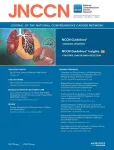(Press-News.org) PLYMOUTH MEETING, PA [March 10, 2023] — New research in the March 2023 issue of JNCCN—Journal of the National Comprehensive Cancer Network highlights how the lack of genomic research for people with African ancestry, particularly those from the Sub-Saharan region, is hampering efforts to reduce disparities for people with cancer. In a first-of-its-kind study, the researchers evaluated molecular genetic results for 113 Black South African men diagnosed with advanced prostate cancer to find evidence for increased and potentially unique genetic testing recommendations.
The researchers point out that, according to the GLOBOCON 2020 studies, the regions of the world most impacted by prostate cancer mortality include populations with significant African ancestry, such as the Caribbean and the regions of Sub-Saharan Africa, with mortality rates 3.4- and 2.5-fold greater, than reported for the United States, respectively. Within the United States, African American men are at 2.3- to 5-times increased risk for prostate cancer associated death than their non-African American counterparts.
“Although men of African ancestry have the highest incidence rates for aggressive prostate cancer and associated death globally, due to lack of available data, no tailored testing criteria have been established for such populations at increased risk” said lead researcher Kazzem Gheybi, MD, PhD, of The University of Sydney in Australia. “This study opens the door to begin to establish new criteria, providing men of African ancestry with hope that germline testing can change current disparities in clinical outcomes.”
“The African diaspora is highly diverse, so I caution against regarding the most genetically diverse population in ‘singular’ terms,” added senior researcher Vanessa M. Hayes, PhD, also from The University of Sydney and the University of Pretoria in South Africa. “What is required is concerted effort for inclusion that takes a grassroots approach. We need to build criteria based on population-specific knowledge. We encourage cancer care and germline screening providers to establish a research and development arm tailored specifically for African inclusion. We need to move away from the one-size-fits-all model for prostate cancer care; African solutions should address African-relevant disparities in prostate cancer outcomes.”
The study included a close examination of 21,899 single-nucleotide variants, 4,626 small insertions and deletions, and 73 structural variants across 20 genes from the 113 patients. After initially excluding variants that were known not to be cancer-causing, they found 38 mutations across 52 patients. A total of 17 pathogenic (4) and potential oncogenic (13) variants were identified. The 5.6% rate of rare cancer-causing variants in this population was significantly lower than the established rate of 11.8% for non-African patients with confirmed metastatic prostate cancer, suggesting decreased sensitivity of current gene panels for risk assessment in this patient population.
“This study highlights the poor clinical utility (30%) of the currently most-utilized germline testing panels in men of African ancestry, largely due to minimal inclusion of these groups in the development of the panels,” commented Samuel L. Washington III, MD, MAS, Assistant Professor of Urology; Epidemiology & Biostatistics, University of California, San Francisco (UCSF) Helen Diller Family Comprehensive Cancer Center, who was not involved in this research.
Dr. Washington, who is also a Member of the NCCN Clinical Practice Guidelines in Oncology (NCCN Guidelines®) Panel for Prostate Cancer Early Detection, continued: “This study emphasizes two crucial domains: 1) it provides further evidence of the need for greater inclusivity in genetic panel development and 2) it recognizes that disparities in outcomes for men of African ancestry can’t be explained solely by the findings in 113 Black South African males. Although the NCCN Guidelines for Prostate Cancer Early Detection identify Black/African American identity as a risk factor, the panel notes the contributions of poor access to care, social determinants of health/social risk, and heritable genes to these observations. I look forward to further research in this area that examines how the limitations of our current tools can be improved to better reflect the populations we serve.”
To read the entire study, visit JNCCN.org. Complimentary access to “Evaluating Germline Testing Panels in Southern African Males with Advanced Prostate Cancer” is available until June 10, 2023. Visit NCCN.org/harmonized to learn more about NCCN’s global program, including resources tailored specifically for people in Sub-Saharan Africa.
# # #
About JNCCN—Journal of the National Comprehensive Cancer Network
More than 25,000 oncologists and other cancer care professionals across the United States read JNCCN—Journal of the National Comprehensive Cancer Network. This peer-reviewed, indexed medical journal provides the latest information about innovation in translational medicine, and scientific studies related to oncology health services research, including quality care and value, bioethics, comparative and cost effectiveness, public policy, and interventional research on supportive care and survivorship. JNCCN features updates on the NCCN Clinical Practice Guidelines in Oncology (NCCN Guidelines®), review articles elaborating on guidelines recommendations, health services research, and case reports highlighting molecular insights in patient care. JNCCN is published by Harborside. Visit JNCCN.org. To inquire if you are eligible for a FREE subscription to JNCCN, visit NCCN.org/jnccn/subscribe. Follow JNCCN on Twitter @JNCCN.
About the National Comprehensive Cancer Network
The National Comprehensive Cancer Network® (NCCN®) is a not-for-profit alliance of leading cancer centers devoted to patient care, research, and education. NCCN is dedicated to improving and facilitating quality, effective, equitable, and accessible cancer care so all patients can live better lives. The NCCN Clinical Practice Guidelines in Oncology (NCCN Guidelines®) provide transparent, evidence-based, expert consensus recommendations for cancer treatment, prevention, and supportive services; they are the recognized standard for clinical direction and policy in cancer management and the most thorough and frequently-updated clinical practice guidelines available in any area of medicine. The NCCN Guidelines for Patients® provide expert cancer treatment information to inform and empower patients and caregivers, through support from the NCCN Foundation®. NCCN also advances continuing education, global initiatives, policy, and research collaboration and publication in oncology. Visit NCCN.org for more information.
END
Individuals with Type 1 diabetes have a smaller pancreas than people without diabetes. This is surprising because insulin-producing beta cells account for just a small fraction of the pancreas, so the loss of beta cells in Type 1 diabetes would not be expected to reduce pancreas size.
Now, a study of one family from Alabama has led Vanderbilt University Medical Center researchers to discover that insulin deficiency, independent of the autoimmunity associated with Type 1 diabetes, is the principal factor leading to a markedly smaller pancreas.
Four ...
Urology involves some of the most intimate medical conditions, yet patients don’t necessarily always prefer to be treated by a urologist of their own gender, new research has found.
In some situations, male and female patients would prefer a male urologist but in others – if they have a painful condition, for example – both men and women would choose to be treated by a female doctor.
The study, by researchers from University Hospital Munich, is being presented today at the European Association of Urology (EAU) Congress ...
Testing for genetic mutations in urine can detect bladder cancer years before the disease shows clinical symptoms, new research has shown.
The study, by researchers from France, Iran and the United States, identified mutations across ten genes that were able to predict the most common type of bladder cancer up to 12 years in advance of diagnosis.
The findings are presented today at the European Association of Urology (EAU) annual Congress in Milan.
Bladder cancer is not a rare disease – it is one of the top ten most common cancers in ...
Existing thought in the orthopedic world is that treating a bunion with the minimally invasive procedure MISB may make a person’s flatfoot worse. A new study by researchers at Hospital for Special Surgery (HSS) in New York City shows that this procedure does not make flatfoot worse in people with asymptomatic flatfoot and may even improve the condition. The findings were presented today at the annual meeting of the American Academy of Orthopaedic Surgeons (AAOS).
“Because of the way the bunion correction is performed with MISB, there is a thought that it may not help stabilize the ...
Tokyo, Japan – Scientists from Tokyo Metropolitan University have used machine learning to automate the identification of defects in sister chromatid cohesion. They trained a convolutional neural network (CNN) with microscopy images of individual stained chromosomes, identified by researchers as having or not having cohesion defects. After training, it was able to successfully classify 73.1% of new images. Automation promises better statistics, and more insight into the wide range of disorders which cause cohesion defects.
Chromosomes consist of long DNA molecules that contain a portion of our genes. When cells divide, ...
Cambridge researchers have observed a highly unusual behaviour in the endangered freshwater mussel, Unio crassus. In spring, female mussels were seen moving to the water’s edge and anchoring into the riverbed, with their back ends raised above the waterline. Then they squirted out regular water jets, which landed in the water up to a metre away. Squirting cycles lasted 3-6 hours. This behaviour has never been seen in any other mussel species. The jets disturb the river surface and attract ...
The first images from the largest program in the James Webb Space Telescope’s first year show many types of galaxies, including dazzling examples of spiral galaxies, gravitational lensing, and evidence of galaxy mergers. Scientists from the COSMOS-Web program released mosaic images taken in early January by JWST’s Near-Infrared Camera (NIRCam) and Mid-Infrared Instrument (MIRI).
COSMOS-Web aims to map the earliest structures of the universe and will create a wide and deep survey of up to 1 million galaxies. Over the course of 255 hours of observing time, COSMOS-Web ...
Pulmonary fibrosis is a devastating disease characterized by progressive scarring in the lungs, killing up to half of patients within five years of a diagnosis. Little is known about whether there are differences in how the condition affects individuals of different ethnicities. New research at the University of Chicago Medicine has found that Black patients with pulmonary fibrosis are significantly younger than their Hispanic and white counterparts across a wide variety of disease metrics, including diagnosis, first hospitalization, lung transplant and death.
“Pulmonary fibrosis is a deadly disease, and people are often diagnosed right around the time they retire,” ...
ITHACA, N.Y. – Domestic production of solar panels – most of which are now made in Asia – can speed up decarbonization in the U.S., according to new Cornell University research published in Nature Communications.
The scientists found that if solar panel manufacturing can return to the U.S. by 2035, the greenhouse gas emissions resulting from panel creation would be reduced by 30% and energy consumption would be cut by 13%, compared to 2020, when the U.S. relied almost entirely on international trading partners.
Manufacturing crystalline silicon photovoltaic panels in the U.S. solves logistical challenges and eases greenhouse gas problems, according ...
The research is based on new analyses of stone tools used by long-tailed macaques in the Phang Nga National Park in Thailand. These monkeys use stone tools to crack open hard-shelled nuts. In that process, the monkeys often break their hammerstones and anvils. The resulting assemblage of broken stones is substantial and widespread across the landscape. Moreover, many of these artefacts bear all of the same characteristics that are commonly used to identify intentionally made stone tools in some of the earliest archaeological sites in East Africa.
“The ability to intentionally make ...





